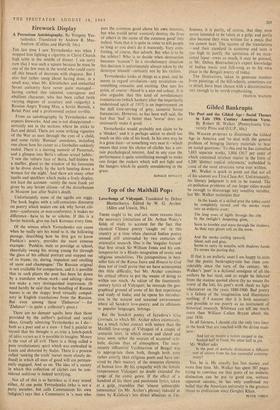Firework Display
A Precocious Autobiography. By Yevgeny Yev- tushenko. Translated by Andrew R. Mac- Andrew. (Collins and Harvill, 16s.) THE last time I saw Yevtushenko was when I stopped him lighting a cigarette at Christ Church high table in the middle of dinner. I am sorry now that I was such a square because he must be one of the few men in the world who could carry off this breach of decorum with elegance. But I also feel rather smug about having done, in a small way, what Mr. Khrushchev and embattled Soviet authority have never quite managed— having curbed this talented, courageous and ebullient character, who has been called (with varying degrees of accuracy and vulgarity) a Russian Angry Young Man, a Soviet Beatnik, a Rebel Poet and a professional enfant terrible.
From an autobiography by Yevtushenko one expects fireworks. And one is not disappointed.— certainly not in the sections where he sticks to fact and detail. There are some striking vignettes of the War as seen through the eyes of a child, and some richly 'Russian' anecdotes, including one about how his career as a footballer suddenly ended. There is a moving memoir of Pasternak, and a glimpse into Beria's odious sexual habits: 'I saw the vulture face of Beria, half-hidden by a muffler, glued to the window of his limousine as he drove slowly by the kerb hunting down a woman for the night.' And there are many other squibs and sparklers which make a lively display, not least the account--surely the most frank yet given by any Soviet citizen—of the disturbances in Moscow just after Stalin's death.
Unfortunately some of the squibs are soggy. The book begins with a self-conscious discourse on poetry which makes one ask why Soviet citi- zens—conformist or non-conformist, it makes no difference—have to be so solemn. If this is a Soviet beatnik, give me Jack Kerouac every time.
Of the winces which Yevtushenko can cause when he really sets his mind to it, the following passage, describing how he first got to know Pushkin's poetry, provides the most extreme example: 'Pushkin, stale as porridge at school, cheerfully swung his strong young fist through the glass of his official portrait and stepped out of its frame, sly, daring, impudent and smelling of snow and champagne.' The Russian original is not available for comparison, and it is possible that in such places the poet has been let down by a translator whose work—and editing—does not make a very distinguished impression. (It need hardly be said that the handling of Russian names is on the sloppy level virtually compul- sory in English translations from the Russian. But even among these 'Zhdnovov' — for `Zhdanov'—is quite a collector's piece.)
There are no damper squibs here than those provided by the author's political and social ideas. Greatly admiring Yevtushenko as I do— both as a poet and as a man--1 find it painful to record that his thought is as,trite a hotch-potch of irides recues as ills possible to imagine. Money is the root of all evil. There is a thing called a pure revolutionary spirit which was embodied in Lenin and distorted by Stalin. There is a process called 'seeking the truth' (never more closely de- fined) in which all men of good will are perman- ently engaged. And so on. The idea of a society in which this collection of cliches can be con- sidered seditious is indeed terrifying.
Not all of this is as harmless as it may sound either. At one point Yevtushenko (who is not a party member, but calls Communism his own 'religion') says that a Communist is 'a man who
puts the common good above his own interests, but who would never wantonly destroy the lives
of others in the name of the common good' (my italics). Note that it is quite in order to kill people as long as you don't do it wantonly. Very com- forting, of course, that adverb. But who is to be the arbiter? Who is to decide when destruction becomes 'wanton'? In a revolutionary situation this decision is unfortunately always taken by the destroyer himself—certainly not by his victims.
Yevtushenko looks at things as a poet, and he seems to regard revolution—any revolution—as something romantic and exciting. One sees his point, of course—blood-is a nice red colour, It is also arguable that this kind of revolutionary romanticism (which hankers after the imperfectly understood spirit of 1917) is an improvement on the dull time-serving of grey, careerist Soviet bureaucrats. However, as has been well said, the fact that 'bad' is better than 'worse' does not necessarily make it good. • Yevtushenko would probably not claim to be a 'thinker,' and it is perhaps unfair to dwell too much on this side of his book. In his own way he is a great man—or something very near it—which means that even his choice of cliches has a cer- tain psychological interest. And in any case the performance is quite scintillating enough to make one forget the rockets which will not light and the bangers which lie quietly smouldering in the grass.
RONALD HiN(I E y






























 Previous page
Previous page